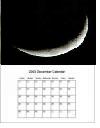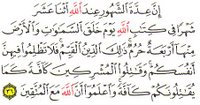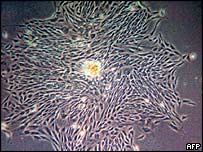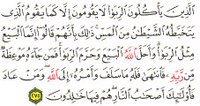Translation :
That is because they say: "Trade is like usury
but Allah hath permitted trade and forbidden usury.
Those who after receiving direction from their Lord desist shall be pardoned for the past; their case is for Allah (to judge); but those who repeat (the offence) are companions of the fire:
they will abide therein (for ever).
The arabic word riba literally means increase in or addition to anything. Technically it applies to that sum which the creditor charges from the debtor at a fixed rate on the principal he lent.
At the time of revelation of the Quran interest was charged in several ways.
A) A person sold something and fixed a time limit for repayment. If the buyer failed to pay it within the fixed period then he was allowed more time but had to pay an additional sum.
B) A person lent a sum of money and asked the debtor to pay it back together with an additional sum of money within a fixed period.
C) A rate of interest was fixed for a specified period and if the principal along with the interest was not paid within that period ; then the rate of interest was increased for the extended period.
There are 2 fundamental differences between interest and trade.
A) In trade, the settlement of profit between the buyer and the seller is made on equal terms.
The buyer purchases the article he needs and the seller gets a profit for his product or service and the time labour and intellect he expended for it.

Profit and interest obviously produce totally different moral and economic results.
Let us first analyze from a moral perspective.
From an economic point of view we find that there are 2 kinds of loans.
1) A personal loan that is taken by the helpless needy people for their own needs.
2) A business loan that is taken by business to finance trade industry etc
 As far as the first kind is concerned we all know what ruinous results it produces. The money lenders and bankers suck the blood of labourers peasants and the common man making their condition exteremely deplorable. Even after paying interest that is many times the principal amount, they still remain in debt. A major portion of their income is taken by the money lender and it is difficult to make both ends meet. Naturally this kills their interest for work and some are even driven towards suicide. This selfish money lending leads to the fattening of a few at the expense of a vast under privileged majority resulting in general inefficiency and a lowering of the productivity of the nation. When the suppressed anger of these exploited masses reaches a crescendo, it erupts in the form of bloody revolutions that sweep away the life and honor of the upper class with all their ill-gotten wealth.
As far as the first kind is concerned we all know what ruinous results it produces. The money lenders and bankers suck the blood of labourers peasants and the common man making their condition exteremely deplorable. Even after paying interest that is many times the principal amount, they still remain in debt. A major portion of their income is taken by the money lender and it is difficult to make both ends meet. Naturally this kills their interest for work and some are even driven towards suicide. This selfish money lending leads to the fattening of a few at the expense of a vast under privileged majority resulting in general inefficiency and a lowering of the productivity of the nation. When the suppressed anger of these exploited masses reaches a crescendo, it erupts in the form of bloody revolutions that sweep away the life and honor of the upper class with all their ill-gotten wealth.Some of the evils of usurious business loans are as follows:
a) Those who cannot afford to pay an interest rate higher than the market rate loose out on getting finance no matter how useful they may be for the nation. Whoever meets market rates of interest gets financed irespective of how ruinous or harmful it could be to the nation.
b) The usurious financer is only interested in his own fixed interest and is least concerned about the health of the business he has invested in. He therefore tries to withhold or withdraw his money at the slighest fear of slump in the market. This creates panic and market crashes.
An unbiased study of the above should convince anyone on the evils that are inherent in usury.
I will InshaAllah in later blogs delve deeper into this issue.
 Its the 2nd of Rajab 1427 Hijri of the Islamic Calendar. After Rajab comes the month of Shaban and then of course Ramadhan. All of us should know about the Islamic Calendar or at-taqwīm al-hijrī and be able to name the 12 months of the Islamic Calendar.
Its the 2nd of Rajab 1427 Hijri of the Islamic Calendar. After Rajab comes the month of Shaban and then of course Ramadhan. All of us should know about the Islamic Calendar or at-taqwīm al-hijrī and be able to name the 12 months of the Islamic Calendar.They are
- Muharram
- Safar
- Rabi' al-awwal (Rabi' I)
- Rabi' al-akhir (or Rabi' al-thani) (Rabi' II)
- Jumada al-awwal (Jumada I)
- Jumada al-akhir (or Jumada al-thani) (Jumaada II)
- Rajab
- Sha'aban
- Ramadan
- Shawwal
- Dhu al-Qi'dah
- Dhu al-Hijjah
Allah says in the Quran 9:36
 Translation: The number of months in the sight of Allah is twelve (in a year) so ordained by Him the day He created the heavens and the earth; of them four are sacred; that is the straight usage. So wrong not yourselves therein and fight the pagans all together as they fight you all together. But know that Allah is with those who restrain themselves.
Translation: The number of months in the sight of Allah is twelve (in a year) so ordained by Him the day He created the heavens and the earth; of them four are sacred; that is the straight usage. So wrong not yourselves therein and fight the pagans all together as they fight you all together. But know that Allah is with those who restrain themselves.Explanation: Allah says that the new moon comes up only once each month since He created the universe.Thus the year has always been of twelve months. Of these 12 months 4 months are Haraam or Prohibited i.e. in which no war must be waged and there should be peace.
Those 4 months are:
- Dhu al-Qi'dah
- Dhu al-Hijjah
- Muharram
- Rajab
Allah says in the Quran 9:37
 Translation: Verily the transposing (of a prohibited month) is an addition to unbelief: the unbelievers are led to wrong thereby: for they make it lawful one year and forbidden another year in order to adjust the number of months forbidden by Allah and make such forbidden ones lawful. The evil of their course seems pleasing to them. But Allah guideth not those who reject faith.
Translation: Verily the transposing (of a prohibited month) is an addition to unbelief: the unbelievers are led to wrong thereby: for they make it lawful one year and forbidden another year in order to adjust the number of months forbidden by Allah and make such forbidden ones lawful. The evil of their course seems pleasing to them. But Allah guideth not those who reject faith.Explanation: The pagan arabs would practice something called nasi in 2 ways:
A)Whenever it suited them they would declare a prohibited month as ordinary and would continue with their fighting robbery and murder.
They would then declare an ordinary month to be prohibited so as to compensate and make up for the lost number of prohibited months.
B) They would add an extra month into the lunar calendar so that it could sync with the solar year and the all important Hajj would thus fall in the same season of the year saving them from a lot of inconviniences.
By making this practice of nasi unlawful Allah gives the believers clear messages:
A) No human being has the right to turn the unlawful (Haraam) into lawful (Halaal). This is a right that is exclusive to Allah.
B) Allah wants Muslims to follow the lunar calendar so that important months like Ramadhan and Dhu al Hijjah fall under different seasons. For example if the month of Ramadhan circulates among all the seasons of the year then Muslims will get trained to obey His Commandments be it summer winter rain or spring. Similarly for Hajj the pilgrims have to travel during all seasons favourable or unfavourable. It is obvious that this training will help them stand in good stead as they struggle to establish the Religion of Truth in this world.
Suggested reading for further detailed study.
Basic information with some good questions
Wikipedia link has exhaustive information
 Alls fair in love and war. Not so says article 10 of the United Nations Charter on International Rights and Humanatarian Law. The killing of hundreds of civilians in the ongoing Israel Lebanon war raises some uncomfortable questions that need definitive answers.
Alls fair in love and war. Not so says article 10 of the United Nations Charter on International Rights and Humanatarian Law. The killing of hundreds of civilians in the ongoing Israel Lebanon war raises some uncomfortable questions that need definitive answers.Q2) Do such agencies as the International War Crimes Tribunal or the International Criminal Court of Justice have sufficient power and jurisdiction to prosecute and punish the guilty?
Q3) How do we ensure an arms embargo against well known violaters of the above charter?
Q4) Should not we all try to scale down and eliminate armament and nuclear missile technology that is capable of causing death and destruction to millions of innocent civilians?
We came together to fight aids, poverty, illiteracy and disease.
We need to unite again and bring an end to the killing of innocent life.
Allah says in the Holy Quran (2:190)
 Translation: Fight in the cause of Allah those who fight you but do not transgress limits;
Translation: Fight in the cause of Allah those who fight you but do not transgress limits;for Allah loveth not transgressors.
For further explanation and study--->
1 War Ethics in Islam
2 The Ethics of War in Islam
 Prince a five year old boy from India fell and got trapped in a small but deep borewell while playing outside his house. A television news channel broadcast this news and all other channels too picked it up. Suddenly the nation was gripped and glued to their television sets as the electronic media gave live coverage of the trapped boy and the rescue operation underway. People prayed and wept for the five year old who they could watch live trapped in the 60 feet deep 12 inch hole. Even the Prime Minister joined in. The army did a marvellous rescue job by first ensuring food and oxygen supply to the little boy and then boring in a parallel shaft, before finally hauling out Prince to safety.
Prince a five year old boy from India fell and got trapped in a small but deep borewell while playing outside his house. A television news channel broadcast this news and all other channels too picked it up. Suddenly the nation was gripped and glued to their television sets as the electronic media gave live coverage of the trapped boy and the rescue operation underway. People prayed and wept for the five year old who they could watch live trapped in the 60 feet deep 12 inch hole. Even the Prime Minister joined in. The army did a marvellous rescue job by first ensuring food and oxygen supply to the little boy and then boring in a parallel shaft, before finally hauling out Prince to safety.Every human conscience wants good to be rewarded with good and evil with evil.We expect truth to prevail and falsehood to be vanquished.But this is not always possible in this world.
We see that one nation can massacre hundreds and displace thousands in its hatred for another nation or community.The prepetrators of these war crimes go unpunished and are scot free to lead a merry life in this world.Similarly there are so many people who do good without getting any benefits or reward in this life.Thus logic demands that there should be a life in which there is eternal justice;where evil doers are punished and the virtous amply rewarded.This is what is promised by Allah in the Akhira or the Hereafter.

And anyone who has done an atom's weight of evil shall see it.
May Allah guide us all.
Accomplished using MS Paint and a little cut-paste here and there.
Carbon credits are certificates issued to countries that reduce their emission of GHG (greenhouse gases) which causes global warming. One credit is equivalent to one tonne of CO2 emission reduced. Thus we have the developed countries with CC deficit, whereas a developing country like India has one of the highest surplus CC. Carbon credits can be traded in Climate Exchanges.
Interestingly the US has refused to sign the Kyoto protocol, which is a voluntary treaty signed by 141 countries to reduce GHG emission. US refusal is very effectively defended in this article.
Everyone should first realize the importance of preserving and safeguarding the ecology. Man has been sent on this earth by Allah as His Khalifa (vicegerent).
Allah says in the Quran 2:30
Thus it is the duty of man to protect the earth and make sure that the rule of God is established on earth. The Lords prayer in the Bible resonates something similar.
Further suggested reading
1 2 3
The Islamic perspective on such a contemporary and controversial topic is not easy to discuss but I found some information from www.islamonline.net
Dr. Imran Siddiqi, a Ph.D. in Genetics, son of Dr Muzammil Siddique former head of the Islamic Society of North America (ISNA) poses the following questions.


Following also are usesful links on related topics:
IVF Using Donated Sperm
Artificial Insemination from an Islamic Perspective
Does Islam Allow “Surrogate Motherhood”?

This article appeared in the Gulf News today
http://www.gulfnews.com/nation/Employment/10053687.html
I sent a letter to the Editor as follows
"Kudos to Gulf News for highlighting the condition of toilet cleaners through the article "Cleaners appeal over 12-hour shifts" dated 19/7/06.
I have personally heard heart rendering stories from some of these poor souls. Their punishing work schedule and squalid living conditions make a mockery of any self proclaimed claims towards achieving a just and equitable society.
The Labour Ministry should proactively investigate these cleaning companies for any violations, as workers fear loosing their jobs if they launch an official complaint."
Lets hope they publish it.
Alhamdolillah they did. Read the 5th letter in Letters to the Editor dated 24-07-2006
I will try InshaAllah try to give a detailed perspective asap. (1700 hrs)
So here's some thing that we must always bear in mind
Allah says in the Holy Quran 4:135 (part of the ayat is produced below)

Translation : O ye who believe! stand out firmly for justice
Allah also says in the Holy Quran 55:9

Translation: So establish weight with justice and fall not short in the balance
There are several Hadith(sayings of the Prophet Muhammad (pbuh)) pointing to the importance of having good living conditions, respect and justice to labour .
Here are some of them
Wages ought to be sufficient to cover legitimate needs
----------------------------------------------------------------
AlMustawrid ibn Shaddad relates that the Prophet, upon whom be peace, said: "If someone performed a job for us and has no house, let him have a house; if he has no wife, let him have a wife; if he has no servant, let him have a servant; or if he has no mount to ride, let him have one. He who clamors for anything other than these is being excessive.
This is related by Ahmad and Abu Dawud and its chain is sound.
Commenting on the subject, al-Khattabi says:
"This may be interpreted in two different ways.
The first means that the individual is permitted to have a servant or a house deducted from his wages, which are similar to any other wages. He is not permitted to take anything else.
The second means that the zakah worker has the right to have lodging and a servant. Thus, if he does not have a house or a servant, one may be hired to serve him and a house may be rented for him during the tenure of his job.
Wages must be paid in time
---------------------------------
This Hadith is from Al-Tirmidhi and narrated byAbdullah ibn Umar and Ibn Majah transmitted it in which Allah's Messenger (peace be upon him) said, "Give the hireling his wages before his sweat dries."
This topic of labour rights and the challenges of striking a balance between labour and Management, employee and employers is quite a topic and I will attempt to delve deeper InshaAllah in other posts. (1900 hrs)
There is an ayat in the Holy Quran(2:143) part of which is depicted below

"Thus have We made of you an Ummah justly balanced that ye might be witnesses over the nations and the Apostle a witness over yourselves:"
The following is the explanation of the above ayat that I have collected from the exegesis of the Holy Quran.
Wasat ( a word which has been translated into English as midmost,moderate, just, intermediary middle,central or justly balanced)
Wasat which signifies moderate, middle or central is usually applied to a thing considered to be the best of its kind. According to a Hadith reported by al-Tirmidhi from the Companion Abu Said al-Khudri the word Wasat is to be interpreted as "just" in the sense of being the best (Qurtubi).
In order to explain the implications of the word Wasat commentators have usually made use of another Arabic adjective "Mu'tadil" (signifying moderate or temperate) and the noun "I'tidal " which means being equal. Both the words come from the root "Adl" which signifies to be equal or make equal.
The word 'Ummat e Wasat' thus implies a righteous and noble community which does not overstep its limits but follows the middle course and deals justly with the nations of the world and establishes relations with everyone on the basis of truth and justice.
Let us now consider how the moderation of this Ummah is borne out by actual facts.
First let us take up the doctrinal part.
A) In the case of the earlier Ummahs (communities) one would observe that they took their prophets to be sons of Allah and started worshipping them.
Quran 9:30
(Translation) The Jews call Uzair a son of Allah and the Christians call Christ the son of Allah
B) some people among them recognized and acknowledged their prophet but refused to obey him when asked to fight in the way of Allah. They bluntly refused as is borne by
Quran 5:24

(Translation) They said: O "Moses! while they remain there never shall we be able to enter to the end of time. Go thou and thy Lord and fight ye two while we sit here (and watch)
C) sometimes the prophets were tortured by their own followers.
In sharp contrast the Islamic Ummah has deep love for the Holy Prophet Muhammad (pbuh). Muslims have in every period of their history considered it to be the greatest blessing and privilege to get a chance to sacrifice themselves for the Prophet(pbuh), and yet they never exalted Holy Prophet(pbuh) beyond his actual position. Muslims always call him(pbuh) as "Abduhu wa Rasuluhu" (the servant of Allah and his messenger).
If we turn to the religious practice and religious rites we again find similar excesses and aberrations in earlier Ummahs.
A) On the one hand we find their religious scholars misinterpreting or changing the injunctions of their Shariah and even distorting the sacred books for a few pieces of silver and inventing all kinds of ruses to get rid of divinely ordained rites
B) we find people giving up the world altogether imprisoning themselves in monastic cells, refusing to accept their share of blessings in this material world. They believe that imposing hardships on oneself is an act of worship par excellence.
In contrast the history of the Islamic Ummah presents a totally different picture.
It has never adopted monasticism as the supreme form of religious life. In fact Islam forbids such an attitude.
However, through its readiness to sacrifice life, wealth and property for the sake of the commandments of Allah and His Prophet(pbuh), the Ummah showed how to live a spiritual life in this material world. The Islamic Ummah has demonstrated in its practice as no other Ummah that religion is meant to be put into action in the market places and the halls of power as much as in the mosques and contemplative retreats.
C) In the sphere of human and social relations too the earlier Ummahs have in their behavior been guilty of excess in one way or the other.
We have an indifference to human rights and and an utter disregard to the rights of women in particular.
We see them in pursuit of individual interests and desires without the slightest regard to ethics and morality.
They have an exaggerated sentimentality which forbids the eating of animal flesh and which frowns on the accidental killing of an insect.
In contrast once again it is the Islamic Ummah which has set down a clear code of human rights extended to women children and even animals and plants.
Human rights were prescribed not only in times of peace but even on the battlefield
In the economic sphere too the other Ummahs have been prey to excesses of different kinds.
We have the Capitalist system which does not discriminate between the lawful and unlawful and is totally blind to the welfare of the people. It exalts the amassing of wealth as the highest virtue.
There are some economic systems which do not respect for personal property, freedom, liberty and democracy.
However the essence of these two mutually hostile systems is the same: the pursuit of worldly things as the be all and end of all life.
Islamic Shariah brings the conflicting elements into an equilibrium assigning each its proper place. It promulgates certain principles for the distribution of wealth in a balanced manner so that no member of society should be deprived of the basic necessities of life nor should a group or individual appropriate all wealth. Those things which can be shared in common by all the members of society have been entrusted to public or joint control while in certain specific things the right to private property has been fully respected. It made clear cut distinction between Halaal (lawful) and Haraam(unlawful) possessions and laid down the rules for using them
I shall try and enhance this post later on with links so that the above can be supported through different facts and testimonials.
Till then I invite you to delibrate on the above.
My answer is why not?
When the Creator, Cherisher and Sustainer of this world has created this wonderful and beautiful world for all of us, then how could it be possible for Him to leave His creation without Divine Guidance. It is entirely up to our peril to ignore His revelations unto us and follow man-made theories, systems, isms and ways of life.
History and contemporary society are proof that man made laws and doctrines don’t work and so we have not got much choice really if we want to make ourselves happy and turn this world into a better place.
The above is an ayat from the Holy Quran (10:57) which translated means:
O mankind! there hath come to you a direction from your Lord and a healing for the (diseases) in your hearts and for those who believe a Guidance and a Mercy.
So the ball in is in your court.
Follow Divine Revelation if you want to succeed.






